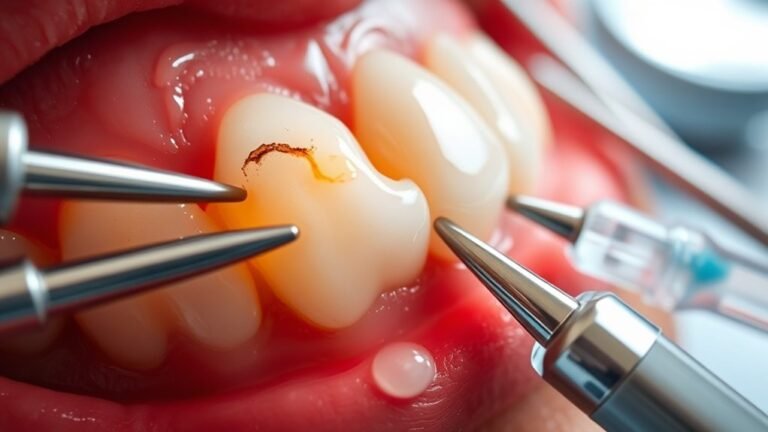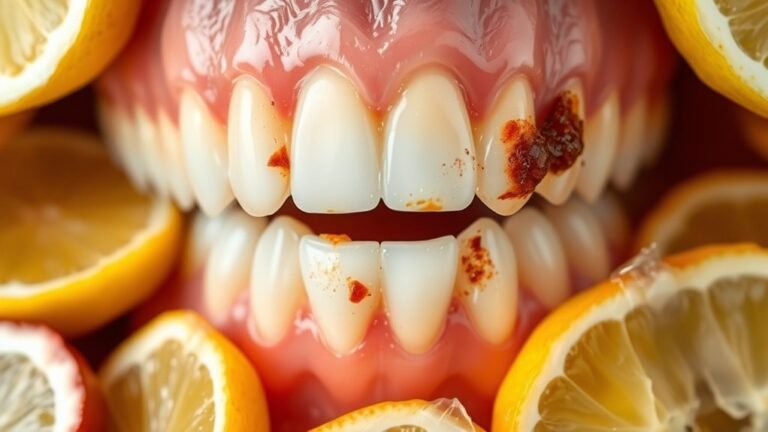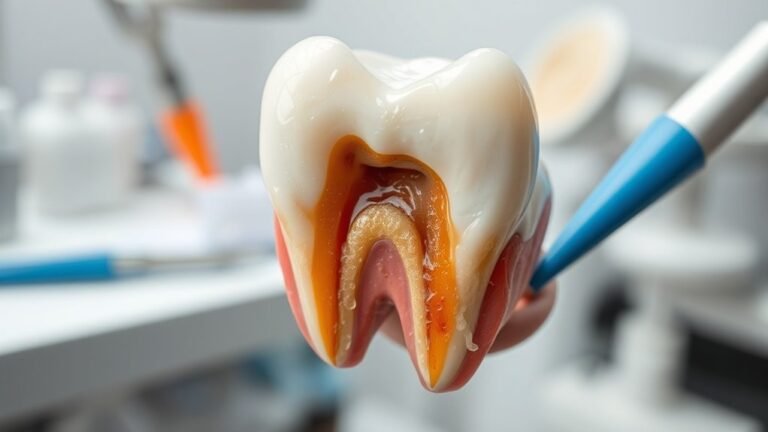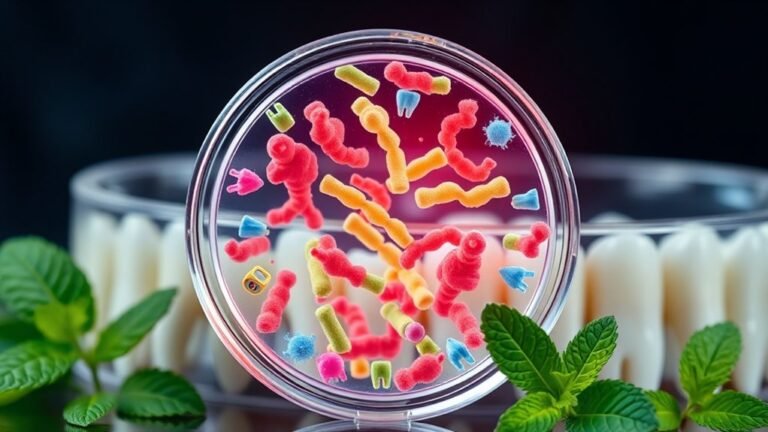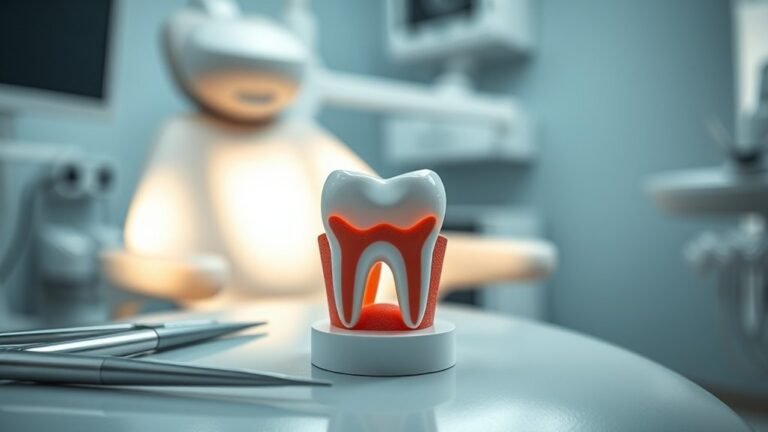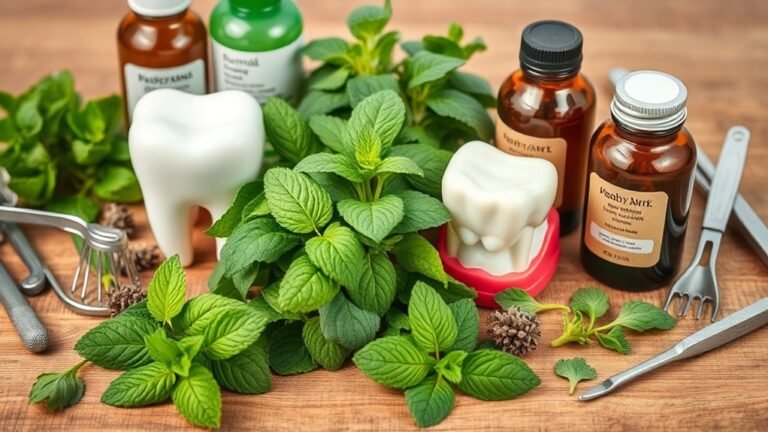What Dietary Changes Help Prevent Enamel Weakening and Tooth Sensitivity
To prevent enamel weakening and tooth sensitivity, focus on incorporating calcium-rich foods like dairy, leafy greens, and nuts into your diet. Add phosphorus sources such as meats, fish, and legumes for added protection. Limit acidic and sugary beverages, as they can lead to enamel erosion. Make certain you get enough vitamin D for calcium absorption and maintain a balanced diet. These dietary changes can greatly improve your oral health, and there’s more to explore on this topic.
Key Takeaways
- Incorporate calcium-rich foods like dairy, leafy greens, and nuts to strengthen tooth enamel and reduce sensitivity.
- Limit intake of acidic and sugary beverages which contribute to enamel erosion and increased tooth sensitivity.
- Consume phosphorus-rich foods such as meats, fish, and legumes to enhance enamel protection and overall dental health.
- Include vitamin D sources in your diet to aid calcium absorption, crucial for maintaining strong enamel.
- Reduce sugar consumption to minimize harmful bacteria production that weakens enamel and increases decay risk.
Understanding Tooth Enamel and Sensitivity
Tooth enamel, the hard outer layer protecting your teeth, plays an essential role in oral health. It acts as a barrier against decay and sensitivity. When enamel weakens, you may experience tooth sensitivity, leading to discomfort when consuming hot, cold, or sweet foods. This sensitivity occurs because the underlying dentin becomes exposed, allowing stimuli to reach the nerve endings. Maintaining strong tooth enamel is vital for preventing these issues and ensuring overall dental health. To protect your enamel, consider your diet and stay away from acidic foods and sugary snacks that can erode it. Regular dental check-ups can help identify early signs of enamel wear, allowing you to take action before sensitivity becomes a significant problem.
Foods That Strengthen Enamel
To strengthen your enamel, incorporating calcium-rich foods and phosphorus sources into your diet is key. Dairy products, leafy greens, and nuts can boost your calcium intake, while meats, fish, and legumes provide essential phosphorus. These nutrients work together to help remineralize and protect your teeth, reducing sensitivity and enhancing overall dental health.
Calcium-Rich Foods
A diet rich in calcium is essential for strengthening enamel and maintaining dental health. Calcium intake plays a crucial role in enhancing teeth strength, making your enamel more resilient against decay and sensitivity. Incorporate foods like dairy products—milk, cheese, and yogurt—as they’re excellent sources of calcium. If you’re lactose intolerant, consider fortified plant-based alternatives such as almond milk or tofu, which also provide calcium. Leafy greens, like kale and broccoli, are great options too. Regularly including these calcium-rich foods in your diet not only supports enamel but also promotes overall oral health. Remember, strong enamel can greatly reduce the risk of tooth sensitivity and cavities, so make sure to prioritize your calcium intake for a healthier smile.
Phosphorus Sources
While calcium often takes the spotlight in discussions about dental health, phosphorus is equally important for strengthening enamel and promoting overall oral health. Including phosphorus sources in your balanced diet can enhance enamel protection and reduce tooth sensitivity.
| Phosphorus Sources | Benefits |
|---|---|
| Meat (chicken, beef) | Supports enamel strength |
| Fish (salmon, tuna) | Rich in omega-3 fatty acids |
| Dairy (cheese, yogurt) | Combines calcium and phosphorus |
| Nuts and seeds (almonds) | Provides essential nutrients |
Beverages to Avoid for Optimal Oral Health
When it comes to maintaining ideal oral health, certain beverages can pose significant risks. Acidic drinks, sugary beverages, and even caffeinated options can contribute to enamel weakening and increased tooth sensitivity. By avoiding these drinks, you can better protect your teeth and enhance your overall dental health.
Acidic Drink Dangers
Many people enjoy sipping on sugary sodas, fruit juices, or energy drinks without realizing the potential harm they’re causing to their teeth. These acidic beverages can lead to enamel decay and increase tooth sensitivity, making cavity prevention challenging. Understanding the acidic food effects is vital for maintaining your oral health.
Here’s a quick reference table to illustrate the impact of common drinks:
| Drink Type | pH Level | Enamel Erosion Potential |
|---|---|---|
| Sugary Soda | 2.5 | High |
| Fruit Juice | 3.0 | Moderate |
| Energy Drink | 3.2 | High |
| Water (pH 7.0) | Neutral | Low |
Opting for lower-acid alternatives can greatly benefit your enamel and overall dental health.
Sugary Beverage Effects
Sugary beverages can wreak havoc on your oral health, as their high sugar content feeds harmful bacteria in your mouth. These bacteria produce acid, leading to acid erosion of your enamel. Over time, this erosion makes your teeth more susceptible to decay and increases tooth sensitivity. As you consume sugary drinks, dental plaque forms, creating a sticky layer that further exacerbates these issues. The sugar effects don’t just stop at cavities; they can also contribute to gum disease and bad breath. To protect your enamel and maintain ideal oral health, limit your intake of sodas, fruit juices, and other sweetened drinks. Opt for water or unsweetened beverages instead to help safeguard your smile.
Caffeinated Drink Considerations
Although caffeine can provide a quick energy boost, it’s important to contemplate how caffeinated drinks can impact your oral health. Regular consumption of soda, coffee, and energy drinks can lead to enamel erosion due to their acidity. This erosion can exacerbate dental sensitivity, making it uncomfortable to enjoy hot or cold foods. To protect your teeth, prioritize good oral hygiene by rinsing your mouth with water after consuming these beverages. If you experience dental sensitivity, consider limiting your intake of caffeinated drinks and opting for alternatives like herbal teas. Remember, maintaining a balanced diet and being mindful of what you drink can considerably contribute to dental sensitivity relief and overall oral health.
Nutrients Essential for Dental Wellness
Nutrients play an essential role in maintaining dental wellness, helping to strengthen enamel and reduce tooth sensitivity. To support your oral health, focus on incorporating key nutrients into your diet:
- Vitamin D: This vitamin aids in calcium absorption, important for enamel strength.
- Calcium: Fundamental for building strong teeth and bones, make sure you’re getting enough calcium through dairy or fortified alternatives.
- Potassium-rich foods: Foods like bananas, sweet potatoes, and spinach help maintain a balanced pH in your mouth, which can prevent enamel erosion.
The Impact of Sugar on Tooth Enamel
When you consume sugar, harmful bacteria in your mouth thrive and produce acids that can erode tooth enamel. This process leads to enamel weakening, making your teeth more vulnerable to decay and sensitivity. The more sugar you eat, the more these bacteria multiply, creating a cycle that can be hard to break. Regular dental care, including brushing and flossing, is essential to combat the effects of sugar, but it’s not always enough. You should also be mindful of sugary foods and beverages, as they can considerably contribute to enamel erosion. By reducing your sugar intake, you can help protect your enamel and maintain better overall dental health. Make informed choices to safeguard your smile against the damaging impact of sugar.
Tips for Incorporating Enamel-Friendly Foods Into Your Diet
Incorporating enamel-friendly foods into your diet can greatly enhance your dental health. Making simple dietary changes can provide essential nutrients for teeth protection while reducing sensitivity. Here are some practical tips to get started:
- Choose dairy products: Incorporate milk, yogurt, and cheese for calcium and phosphorus, which strengthen enamel.
- Add crunchy fruits and vegetables: Snack on apples and carrots that naturally clean your teeth and stimulate saliva production, aiding in enamel remineralization.
- Include nuts and seeds: Almonds and sunflower seeds provide healthy fats and minerals that support overall nutrition and oral health.
Frequently Asked Questions
Can Enamel Regenerate After It Has Weakened?
No, enamel can’t regenerate once it’s weakened. However, you can strengthen remaining enamel through good oral hygiene and dietary choices, like reducing sugar intake and consuming calcium-rich foods to support your dental health.
How Does Stress Affect Tooth Sensitivity?
Like a storm cloud, stress hovers over your teeth, increasing sensitivity. It can cause teeth grinding and jaw clenching, leading to enamel wear. Managing stress through relaxation techniques can help protect your dental health.
Are Home Remedies Effective for Enamel Strengthening?
Yes, some home remedies can be effective for enamel strengthening. Using fluoride toothpaste, oil pulling, and a diet rich in calcium and phosphorus may help. However, consult your dentist for personalized advice and proper treatment options.
What Role Does Genetics Play in Tooth Enamel Health?
Genetics considerably influences tooth enamel health. If your family has a history of weak enamel, you might be more susceptible. Regular dental check-ups and good oral hygiene can help mitigate genetic risks and maintain enamel strength.
Can Certain Medications Contribute to Enamel Erosion?
Yes, certain medications can contribute to enamel erosion. Drugs like antihistamines, antidepressants, and medications causing dry mouth reduce saliva, which protects your enamel. Staying hydrated and discussing alternatives with your doctor can help mitigate these effects.
Conclusion
Incorporating enamel-friendly foods into your diet is like giving your teeth a protective shield. By focusing on nutrient-rich options, avoiding harmful beverages, and minimizing sugar intake, you can strengthen your enamel and reduce sensitivity. Remember, a balanced diet not only supports your dental health but also enhances your overall well-being. Make these dietary changes a part of your daily routine, and you’ll be on the path to a healthier, brighter smile that lasts.

